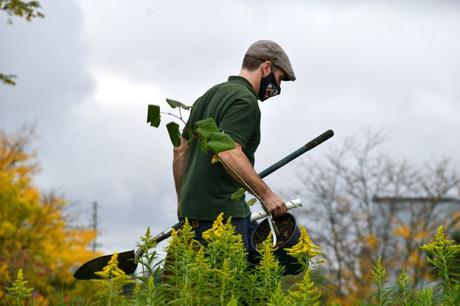
by Stuart Gray
I read a brilliant description of Christian Apologetics, and the role of the Christian apologist this week. In her book Apologetics and the Christian Imagination Holly Ordway describes the task of the apologist as that of a gardener.[1] The narrow way of life that Jesus spoke of, involving belief in Christ and assent to his Lordship in our life, can be blocked by rocks, brambles, and overgrowth so that the path is barely visible to people who are walking past. What this garden needs is a simple gardener to roll up his sleeves, and start the task of clearing the ground, and pruning back the weeds. That way, the path will become visible once again. What are the rocks and brambles that Holly is talking about? I guess it’s anything in our culture that tries to usurp Jesus’ position or obscure his gospel message. What am I talking about?
How about the culture’s imperative for people that their goal in life should simply be to indulge personal autonomy, decide what their best life looks like, and do everything they can to live that life? Do you recognize that big rock? Or perhaps it’s the lie that matter and energy is all there is. That I am a physical being that will one day cease to exist physically, and this means I will cease to exist completely. So, I need to trust the activity in my physical brain, because that’s who I am. Of course, the problem with that knot of weeds is that the notion that the material world is all there is, is itself a metaphysical statement and the meaning of those words is not itself material! So it is, to some extent, a self-refuting position. When we claim physical matter is all there is, we are refuting the meaning of the words we are uttering. This is a useless knot of brambles that needs to be trimmed back and removed at the root by a talented and hardworking gardener.
Here are two important observations on Holly’s notion of apologist as gardener. First, the job of the gardener isn’t a greatly rewarded one in Western culture. It’s a lowly position, and probably not generally well paid. The value the gardener brings is not matched by a high salary. Maybe you could describe a gardener as a blue-collar worker. I think this is generally in line with the role of Christian apologist in the church. This role is not well accounted for generally, and probably not well understood by those in the church. We are good at recognizing problems in the culture. But perhaps we don’t know how to work those problems and uproot them. Second, gardeners are not generally high-profile individuals. When we employ a gardener to sort out the mess in our garden, we release them into that mess. They need to go, and we don’t want to see them again till their job is done. In some cases, they may be physically obscured by all the undergrowth they are rooting out. The worker is hidden for a while by the garden they are working in. But eventually, the result of their skillful hard work becomes evident. The garden is cleared, and the path is revealed again. Yet the gardener takes a back seat at that point to the beauty and utility of the garden and the path. And then he moves on to the next garden. Christian apologists, as gardeners, are generally not high-profile super stars. Rather, they are lowly and hardworking individuals who are committed to the cause of Christ in the world. Their goal is to make the good news visible and understandable to those who need it. That’s not to say some apologists might become well known. But on the whole, if we are working in this field of apologetics, our role does not require either fame or notoriety.
Here’s one final point Holly makes. She draws a distinction between the apologist and the evangelist.[2] It’s the role of the apologist, or gardener, to clear the way for the path to become visible. However, it’s the role of the evangelist to call people toward walking the path. The evangelist says – “Here’s Jesus’ path, walk it!” But the apologist makes that journey possible in the first place. She suggests that apologists are required to work both inside and outside of the church. That this role is as much about the strengthening and equipping of Christians to live their Christian lives, as it is about responding to questions about the faith. The danger of leaving undergrowth alone is that it increases in size, and eventually becomes a problem. Unaddressed questions and issues in the life of the Christian can lead to problems later. So, it’s important to get help from a skilled worker to help clear these issues before they become problems in the life of the believer.
I’ve heard apologists described as those who are working to fill potholes in the road so that people can make progress spiritual progress in their lives towards a life that honours Christ. I think the gardener metaphor is also useful as it highlights the culture’s role in obscuring the Christian message. And it also highlights the hard work involved in identifying and removing false cultural messages, not just making up for them.
[1] Holly Ordway, Apologetics and the Christian Imagination An Integrated Approach to Defending the Faith, (Steubenville:Emmaus Road Publishing, 2017), 12.
[2] Ibid.
